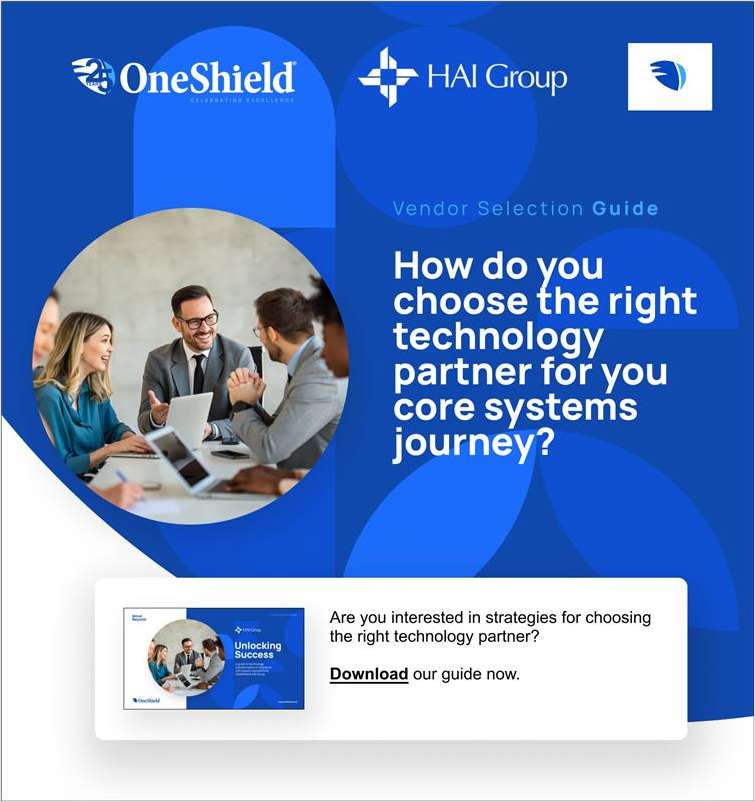Are standards the Holy Grail for insurers? There may not be aperfect system yet, but most CIOs and industry observers we talkedto believe that insurance has grown to a point that carriers cantafford to use proprietary communication channelsnot if they want tokeep connected to their agents and the global insurancemarket.
Adapting industry-wide standards for data communication may meandiminishing some of your companys competitive advantage, but thelong-term reduction in costs for you and your business partners canmore than make up for that.
The Holy Grail itself appears to have been written in extensiblemarkup language (XML). As Jamie Bisker, acting director ofinsurance practices for the Tower Group (www.towergroup.com), said, XML willpave the path for all financial services, and all of them will bethat much better off.
How important are standards to insurers? Guy Mills, assistant vicepresident of information systems for Manulife (www.manulife.com), sees severaladvantages. For one, they reduce the number of proprietary softwarepackages floating around. Standards help software companies makeinvestments so their products are attractive to more than just onecompany, he said. Thats beneficial to both sides: Most softwarecompanies dont have the capital that insurance carriers have, butthere are benefits to the carriers as well. Carriers are tired ofspending large sums of money on customized software, Mills said.This helps spread the cost.
Jim Williams, CIO of Royal & Sun Alliance (www.royalsunalliance.com)agrees. Standards have saved us a lot of money, he said. They allowus to communicate and work with multiple vendors and agents. Hesaid the movement to XML will be a major breakthrough for financialservices in general. XML standards not only apply to insurance, butto the financial community as well. It will allow a sharing ofinformation back and forth with our partners in insurance andoutside the industry with other business partners, he said.
Diana Beecher, senior vice president and CIO of Travelers (www.travelers .com), said standards arenot an absolute in insurance. You can find ways of getting by, shesaid. She just doesnt recommend that course. Business flow can beeasier and more efficient, and the industry operates better overallwith [standards], Beecher said. The more simply and efficientlystandards work, the better off the whole industry findsitself.
Companies looking for the long term viability of their operationneed a common ground for communication, according to Dave Peters,assistant director of information technology for the PrincipalFinancial Group (www.principal.com). If you have alarge number of trading partners, you need a convergence ofstandards, not only for business product lines, but acrossindustries, he said.
A Check-Box Item
The proof of how valuable standards can be is usually found when acarrier adds a new piece of software to its system. Peters saidthere are times when you need them and when you dont. It depends onthe niche you need to fill, he said. Point to point relationshipsare expensive and hard to maintain. Our strategy has been to go tothe ACORD XML standards.
Williams feels it is a collaborative effort on both sides. Wherewere heading is more and more in that direction, he said. Buyingstandard-compliant software is just as important as cost savings,he added.
For Manulife, there is no debate. Compliance with standards is acheck-box item when dealing with a potential vendor partner. Mostcarriers wont consider (vendors) if they dont use standards,Williams said. He adds that standards are not the most importantpart of any software purchase, but vendors better be prepared tocomply in some range if they expect to win the contract. ForManulife, it is a financial decision. Standards are a goodinvestment, he said. It saves people from reinventing thewheel.
Beecher says that the important thing for carriers is to be able tobuild a gateway between any new products and the rest of thesystem. It is more time consuming to build an infrastructure thanit is to build a bridge, she said. Making new products compliant isnot a major problem for her IT department, particularly if theproduct is one worth adding. Its easier to build a gateway than itis to restructure, she said.
Playing Nice Together
Mills points out that as insurers increasingly rely on the Web, XMLstandards become even more important. He said many life insurersare looking to online aggregators to sell their product. Without astandards-based language to communicate with each other, such saleswould be impossible. Manulife also completed straight throughprocessing projects for its Canadian division in 2000 and for itsJapanese division last October. About half the project involved thepurchase of new software and Mills said, We told our vendors thatwe would be using ACORD standards.
Bisker is hardly surprised. ACORD is pretty well accepted, he said.XML, in particular, is the direction for the future. The otherstandards are not as important as XML right now, he said.
With ACORD, Everybody is playing nice together, Beecher said. Thebetter it can deliver on what it promises or provide a forum, thebetter everybody is.
Peters likes the direction ACORD (www.acord.org) is headed with XMLstandards. It should have a long life span, he said. It will takesomething with similar capabilities to replace it. But he knowsthere will continue to be problems, particularly with theindependent agent system. Everyone wants to upgrade, but no onewants to pay for it, he said. Carriers and agents have a hard timejustifying expenses when they are able to find a way to make theirpresent system work. You have to find a business value to make suchan investment, Peters said.
The recognition in the industry is that XML is here to stay,Williams said. It is important for all of us to play in that space.I see very few insurers who wont be using ACORD standards. ACORDsexperience in the U.S. market makes them stand so tall, andWilliams said that reputation will enable ACORD to be at the centerof discussions among global standards groups.
ACORD will lead that effort to develop a global model, Williamssaid. It may be hard with the different cultures in the world. Itcertainly wont be done overnight. They will need somecooperation.
A close eye on expenses always has and always will be a majorfactor in American business and ACORDs Rob Marone believesstandards fit into that niche. The business drivers are ofteneconomics, he said. Problems drive cost cutting. Sharing thisability to communicate has eliminated many business problems thatinsurers of all stripes face. With XML, the future looks evenbrighter.
|Unification
ACORDs eMerge hopes to have everyone speaking the samelanguage.
We may all be in the insurance business, but theres little doubtthat what some of us do has nothing whatsoever to do with whatothers in the industry are up to. So why do we spend so much timeand money on communications tools?
Isolationism hasnt been in style since Roosevelt sat in the OvalOffice. The insurance industry is constantly changing and its timethat all of usP&C companies, life insurers, and reinsurersspeakthe same language.
Working on this Esperanto of insurance is, as you might expect,ACORD (www.acord.org) which hasformed eMerge, a group that is hoping to bring the disparateinsurance industry standards under one roofP&C, life,reinsurance, annuities, and so forth, both in the United States andabroad.
Over the years, ACORD has helped develop a variety of separatestandards for various sides of the insurance market. Its time tobring them together, said Rob Marone, who has the slick title ofstandards evangelist.
Each of them grew up in silos, Marone said. We want them to have aseamless integration within the industries.
Integration among the various lines of business is not ACORDs onlygoal for the future. With various industries under the financialservices umbrella merging, and lines blurring as new legislation iswritten, communication between banks and insurers and brokerageswill be even more important. Sound tough? I said it was a goal, Ididnt say it would be easy, Marone said.
ACORD is in the midst of a survey of membership and usage that itwill release during its annual technology conference in May. No onewill argue that ACORD sets the standard for standardsthis studywill help document that leadership.
Some companies have philosophical differences with us, but thatsvery rare, Marone said. Some just want to do things their own way.Thats also an exception, unless you can show an immediate return oninvestment. RRH
Want to continue reading?
Become a Free PropertyCasualty360 Digital Reader
Your access to unlimited PropertyCasualty360 content isn’t changing.
Once you are an ALM digital member, you’ll receive:
- All PropertyCasualty360.com news coverage, best practices, and in-depth analysis.
- Educational webcasts, resources from industry leaders, and informative newsletters.
- Other award-winning websites including BenefitsPRO.com and ThinkAdvisor.com.
Already have an account? Sign In
© 2024 ALM Global, LLC, All Rights Reserved. Request academic re-use from www.copyright.com. All other uses, submit a request to [email protected]. For more information visit Asset & Logo Licensing.








